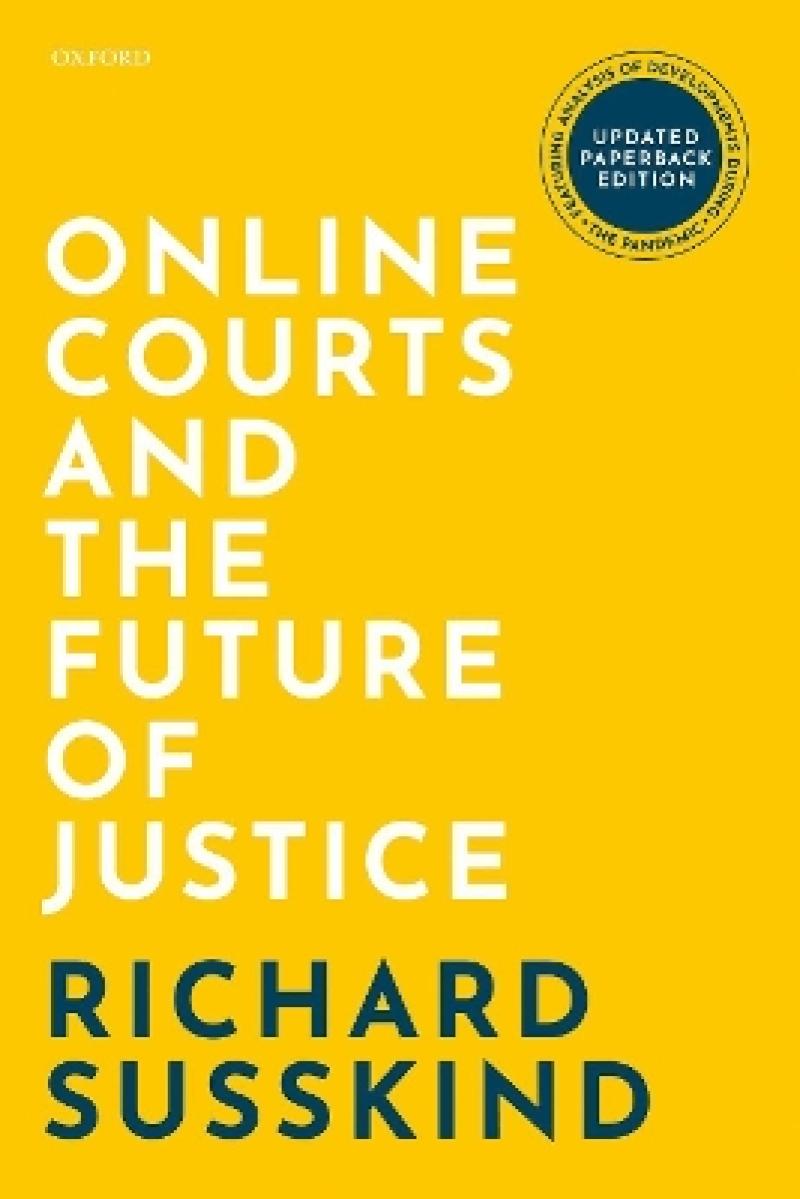Our court system is struggling. It is too costly to deliver justice for all but the few, too slow to satisfy those who can access it. Yet the values implicit in disputes being resolved in person, and in public, are fundamental to how we have imagined the fair resolution of disputes for centuries. Could justice be delivered online? The idea has excited and appalled in equal measure, promising to bring justice to all, threatening to strike at the heart of what we mean by justice.
With online courts now moving from idea to reality, we are looking at the most fundamental change to our justice system for centuries, but the public understanding of and debate about the revolution is only just beginning.
In Online Courts and the Future of Justice Richard Susskind, a pioneer of rethinking law for the digital age, confronts the challenges facing our legal system and the potential for technology to bring much needed change. Drawing on years of experience leading the discussion on conceiving and delivering online justice, Susskind here charts and develops the public debate.
Against a background of austerity politics and cuts to legal aid, the public case for online courts has too often been framed as a business case by both sides of the debate. Are online courts preserving the public bottom line by finding efficiencies? Or sacrificing the interests of the many to deliver cut price justice? Susskind broadens the debate by making the moral case (whether online courts are required by principles of justice) and the jurisprudential case (whether online courts are compatible with our understanding of judicial process and constitutional rights) for delivering justice online.
Includes a substantial new chapter updating the book with the developments in online courts since the onset of Covid-19.
Les mer
In this book Richard Susskind, a pioneer of rethinking law for the digital age confronts the challenges facing our legal system and the potential for technology to bring much needed change. Drawing on years of experience leading the discussion on conceiving and delivering online justice, Susskind here charts and develops the public debate.
Les mer
PART ONE - CONTEXT
1: The case for change
2: Advances in technology
3: Thinking strategically
4: Legal theory of courts
5: Physical, virtual, online hearings
6: Access to justice revisited
PART TWO - ARCHITECTURE
7: The vision
8: Online guidance
9: Assisted argument
10: Containment
11: Online resolution by judges
12: Civil, criminal, family disputes
13: Case studies
PART THREE - THE CASE AGAINST
14: Economy-class justice
15: Adversarial v investigatory
16: Open justice and fair trial
17: Face-to-face justice
18: Digital exclusion
19: Loss of majesty
20: Public sector technology
PART FOUR - THE FUTURE
21: Machine learning and prediction
22: Technology-mediated negotiation
23: Artificial intelligence
24: Telepresence, augmented reality and virtual reality
25: The role for human beings
Further Reading
Les mer
In summary, Susskind's latest book is another extraordinary contribution to justice reform. It is an engaging work that will hopefully spark debate and reform. It is written with a lively tone and provides much food for thought about what our justice systems could look like now and into the future.
Les mer
Professor Richard Susskind OBE is an author, speaker, and independent adviser to international professional firms and national governments. He is President of the Society for Computers and Law, IT Adviser to the Lord Chief Justice of England, and Chair of the Advisory Board of the Oxford Internet Institute. His numerous books include the best-sellers, The End of Lawyers? (OUP, 2008) and Tomorrow's Lawyers (OUP, 2013), his work has been translated into more than 10
languages, and he has been invited to speak in over 40 countries.
Les mer
Includes a substantial new chapter updating the book with the developments in online courts since the onset of Covid-19
A pioneer of rethinking law for the digital age delivers a major statement on the future of justice
Susskind is at the forefront of imagining and delivering on the potential for online courts
Tackles the fundamental controversies about delivering justice online - do online courts bring justice to the many or deliver cut price law? Will they be transparent or closed?
Les mer
Produktdetaljer
ISBN
9780192849304
Publisert
2021
Utgiver
Vendor
Oxford University Press
Vekt
536 gr
Høyde
232 mm
Bredde
156 mm
Dybde
30 mm
Aldersnivå
P, 06
Språk
Product language
Engelsk
Format
Product format
Heftet
Antall sider
400
Forfatter
